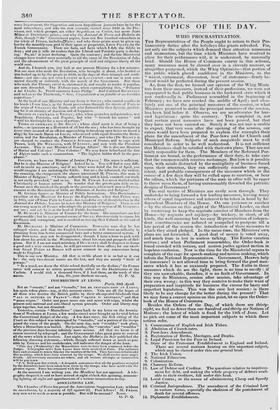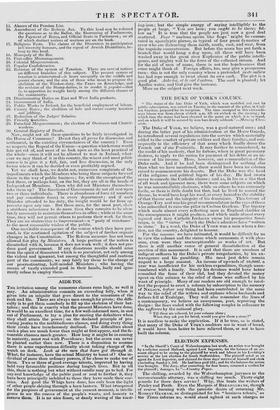TOPICS OF THE DAY.
WHIG PROCRASTINATION.
Tim Representatives of the People ought to return to their Par- liamentary duties after the holydays like giants refreshed. For, not only are the subjects which demand their attention numerous and momentous, but the time which Ministers have resolved to allow for their performance will, it is understood, be unusually brief. Should the House of Commons concur in this scheme, many measures must be slurred over in a slovenly manner, or altogether postponed, which the Whig Optimists—that portion of the public which placed confidence in the Ministers, as the " wisest, virtuousest, disereetest, best" of statestnen—firndy be- lieved would be perfected during the present session.
As, from the first, we formed our opinion of the Whig Minis ters from their measures, instead of their professions, we were not unprepared to find public business in the backward state which it now confessedly is. Parliament assembled in the beginning of February ; we have now reached the middle of April ; and abso- lutely not one of the principal measures of the session, or what Ministers promised to make the principal measures of the session, has been laid before it. Observe, we are no advoCates for hur- ried legiskition : quite the contrary. The complaint is, not that certain great measures have not been passed, but that they have not been entered on. Surely it was not unr, a-enable to expect, that very soon after the opening of the session; our rulers would have been prepared to explain (for example) their plans for the amendment of the Poor-laws and for Church and Municipal Reform. Subjects of such magnitude must be well considered in order to be well understood. It is not sufficient that Ministers shall be satisfied with their own plans. They are not solely responsible for them. The Members of the Reformed Par- liament are bound, in the performance of their duty, to take care that the commonwealth receives nodamage. But how is it possible that, with minds distracted by the multiplicity of business forced upon their attention, they can sufficiently consider the scope, intent, and probable consequences of the measures which in the course of a few days they will be called upon to sanction, or bear the odium, which the partisans of the men in oflice will be eager to throw upon them, of having unreasonably thwarted the patriotie. designs of Government?
The real tactics of Ministers are easily seen through. They undertake to bring forward a few leading measures, leaving many others of equal importance and interest to be taken in hand by In- dependent Members of the House. On one pretence or another —by the absence on this night of the Ministerial Leader, on that by contriving to keep the requisite number of Members from the Ilouse—by requests and cajolery—by trickery, in short, of all kinds, the well-meaning but too easy Representatives of indepen- dent constituencies are induced or compelled to postpone till a late period of the session the introduction of those measures to which they stand pledged. In the mean time, the Ministers' own plans are not forwarded. A good deal of money is voted away, and much time is lost in useless talking. The Easter vacation arrives ; and when Parliament reassembles, the Order-book is found crowded with notices, and motion jostles against motion in hopeless confusion. Now is the time for the Ministerial organs to complain of the rage for speech-making and motion-making, which infests the National Representatives. Government, Heaven help its innocence! is not allowed time to bring forward'the good mea- sures which it has so anxiously prepared. The faults in those measures which do see the light, there is no time to rectify :. if they are unworkable, therefore, it is no fault of Government. In this way do Ministers, session after session, take advantage of their own wrong: in this way they contrive to make their want of
preparation and inaptitude for business the excuse for hasty and imperfect legislation. This was the case last session : is there likely to be any change for the better during the present? That we may form a correct opinion on this point, let us open the Order- book of the House of Commons.
Besides the Orders of the Day, of which there are thirty- eight, we find no fewer than one hundred and thirty-six Notices of Motions ; the latest of which is fixed for the Loth of June. Let us pick out some of the most important subjects to winch these notices refer.
1. Commutation of English and Irish Tithes.
2. Abolition of Church-rates. a. Poor-laws Amendment.
4. Registration of Births, Marriages, and Deaths..
5. Legal Provision for the Poor in Ireland.
6. State of the Protestant Establishment in England and Ireland. There are several motions bearing on this important subject, which may be classed under this one general head. 7. The Irish Union.
8. National Education.
9. Colonization.
10. Chancery Reform.
11. Law of Debtor and Creditor. The questions relative to imprison- ment for debt, and making the whole property of debtors avail- able to their creditors, fall under this head.
12. Local Courts ; or the means of administering Cheap and Speedy Juctise.
13. Criminal Jurisprudence. The amendment of the Criminal Law in various forms, especially the abolition of the punishment of death for several offences.
14. Diplomatic Establishments. 15. Abuses of the Pension List.
16. Amendment of the Reform Act. To this head may be referred the questions as to the Ballot, the Shortening of Parliaments, the Payment of Rates, and Official Seats in Parliament ; on all of which distinct notices of motions are on the book.
17. Religious Tests. The claims of the Dissenters to participation in University honours, and the repeal of Jewish Disabilities, be- long to this head.
18. Monopoly of the Bar. 19. Post-office Mismanagement.
20. Colonial Misgovernment.
21. Popular Confederacies.
22. Revision of the system of Taxation. There are seveml notices on different branches of this subject. The present system of taxation is aristocratical—it bears unequally on the middle and poorer classes; and the aim of those who mean to propose the abolition of the Window-duty, the Taxes on Knowledge, and the revision of the Stamp-duties, is to render it popular—that is, to apportion its weight fairly among the different classes of the community.
23. Discriminating Duties on East and West India products. 24. Government of India.
2.5. Public Works in Ireland, for the beneficial employment of labour.
26. County Rates ; the abolition of hole and corner county. taxation and jobbing.
27. Reduction of the Judges' Salaries. Friendly societies. 29. Parochial Misgovernment; the election of Overseers and Church- wardens.
30. General Registry of Deeds.
Now, ought not all these questions to be fairly investigated in the House of Commons? Do not they all press for discussion and settlement, in the existing circumstances of the country ? Even as respects the Repeal of the Union—a question which many would fain get rid of, and most of us look upon as the least practical of the whole—since it will not be allowed to rest in Ireland, what- ever we may think of it in this country, the wisest and most politic course is to give it a full, fair, and free discussion, in the only forum where it can be decided or even profitably argued.
Yet we shall hear, we doubt not, numerous complaints of the impediments which the Members who bring these subjects forward throw in the way of public business ; for, with the exception of the first three, or perhaps four, on the list, they are all in the hands of Independent Members. Then why did not Ministers themselves take them up? The functions of Government do not all rest upon two or three individuals. There is abundance of force (if numbers and pay constitute force) in every department ; and if each Minister attended to his duty, the weight would be far from op- pressive upon any one. But these men, for the most part, show a stubborn reluctance to do more than they conceive to be abso- lutely necessary to maintain themselves in office; while at the same time, they will not permit others to perform their work for them. They are an obstruction to improvement—a " party of resistance" to the most reasonable wishes of the public.
One inevitable consequence of the course which they have pur- sued, is the continued agitation of the subject of further organic changes in the Constitution. The Reform measure has not been allowed fair play by Ministers. A large portion of the nation is dissatisfied with it, because it does not work well; it does not pro- duce good government. If any disastrous results should arise from the spirit of discontent which is so prevalent, not only among the violent and ignorant, but among the thoughtful and cautious part of' the community, we may fairly lay them to the charge of our procrastinating, half-minded Ministers ; who having the means of vastly extended good in their hands, lazily and igno- rantly refuse to employ them.





















 Previous page
Previous page